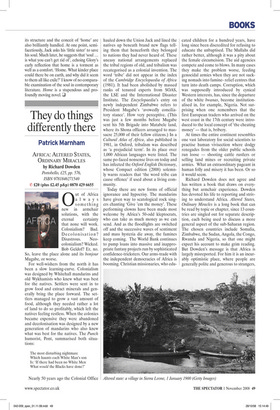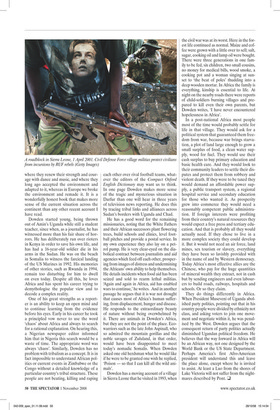They do things differently there
Patrick Marnham
AFRICA: ALTERED STATES, ORDINARY MIRACLES by Richard Dowden Portobello, £25, pp. 576, ISBN 9781846271540 ✆ £20 (plus £2.45 p&p) 0870 429 6655 Out of Africa a l w a y s something new in armchair solutions, with the eternal certainty that none will work. Colonialism? Bad. Decolonisation?
Disastrous. Neocolonialism? Wicked. Bob Geldof? Er, no. So, leave the place alone and its bonjour Mugabe, or worse.
For well-wishers from the north it has been a slow learning-curve. Colonialism was designed by Whitehall mandarins and old Wykhamists who knew what was best for the natives. Settlers were sent in to grow food and extract minerals and generally bring the place forward. The settlers managed to grow a vast amount of food, although they needed rather a lot of land to do so profitably, which left the natives feeling restless. When the colonies became expensive they were abandoned and decolonisation was designed by a new generation of mandarins who also knew what was best for the natives. The Punch humorist, Pont, summarised both situations:
The most disturbing nightmare Which haunts each White Man’s son Is: ‘If there had been no White Men What would the Blacks have done?’
hauled down the Union Jack and lined the natives up beneath brand new flags telling them that henceforth they belonged to nations they had never heard of. These uneasy national arrangements replaced the tribal regions of old, and tribalism was recategorised as a colonial invention. The word ‘tribe’ did not appear in the index of the Cambridge Encyclopaedia of Africa (1981). It had been abolished by massed ranks of tenured experts from SOAS, the LSE and the International Disaster Institute. The Encyclopaedia’s entry on newly independent Zimbabwe refers to President Mugabe’s ‘avowedly conciliatory stance’. How very perceptive. (This was just a few months before Mugabe sent his 5th Brigade into Matabele land, where its Shona officers arranged to massacre 25,000 of their fellow citizens.) In a Cultural Atlas of Africa, also published in 1981, in Oxford, tribalism was described as ‘a prejudicial term’. In its place over 1,000 African languages were listed. The same po-faced nonsense lives on today and has infected the Oxford English Dictionary, whose Compact edition (2008) solemnly warns readers that ‘the word tribe can cause offence’ if used about a living community.
Today there are new forms of official ignorance and hypocrisy. The mandarins have given way to scatological rock singers chanting ‘Give ’em the money’. These performing clowns have been made most welcome by Africa’s 50-odd kleptocrats, who can take as much money as we can send. And as the floodlights are switched off and the successive waves of sentiment and mass hysteria die away, the famines keep coming. The World Bank continues to pump loans into massive and inappropriate fantasy projects run by sophisticated confidence-tricksters. Our arms-trade with the independent democracies of Africa is booming. Christian missionaries, who edu cated children for a hundred years, have long since been discredited for refusing to educate the unbaptised. The Mullahs did rather better, although it was a pity about the female circumcision. The aid agencies compete and come to blows. In many cases they make the problem worse, feeding genocidal armies when they are not sucking nomads into faminerelief centres that turn into death camps. Corruption, which was supposedly introduced by cynical Western interests, has, since the departure of the white bwanas, become institutionalised in, for example, Nigeria. Not surprising when one remembers that the first European traders who arrived on the west coast in the 17th century were introduced to the local concept of ‘the cheating money’ — that is, bribery.
At times the entire continent resembles one vast laboratory for social scientists to practise human vivisection where dodgy renegades from the older public schools run loose — shooting cattle rustlers or selling land mines or recruiting private armies. What an extraordinary pageant in human folly and misery it has been. Or so it would seem.
Richard Dowden does not agree and has written a book that draws on everything but armchair experience. Dowden has devoted his life to reporting and striving to understand Africa. Altered States, Ordinary Miracles is a long book that can be read by topic or chapter, since 13 countries are singled out for separate description, each being used to discuss a more general aspect of the sub-Saharan region. The chosen countries include Somalia, Zimbabwe, the Sudan, Angola, the Congo, Rwanda and Nigeria, so that one might expect his account to make grim reading. But Dowden’s message is that Africa is largely misreported. For him it is an incurably optimistic place, where people are generally polite and generous to strangers, where they renew their strength and courage with dance and music, and where they long ago accepted the environment and adapted to it, whereas in Europe we broke the environment and remade it. It is a wonderfully honest book that makes more sense of the current situation across the continent than any other recent account I have read.
Dowden started young, being thrown out of Amin’s Uganda while still a student teacher, since when, as a journalist, he has witnessed more than his fair share of horrors. He has deliberately run over rioters in Kenya in order to save his own life, and has had a 16-year-old soldier die in his arms in the Sudan. He was on the beach in Somalia to witness the farcical landing of the US Marines in 1992. His memories of other stories, such as Rwanda in 1994, remain too disturbing for him to dwell on even today. Despite all this, he loves Africa and has spent his career trying to demythologise the popular view and to decode a complex reality.
One of his great strengths as a reporter is an ability to keep an open mind and to continue learning from the evidence before his eyes. Early in his career he took a principled vow never to use the word ‘chaos’ about Africa and always to search for a rational explanation. On hearing this, a Nigerian newspaper editor informed him that in Nigeria this search would be a waste of time. The appropriate word was always ‘chaos’. Similarly, Dowden has no problem with tribalism as a concept. It is in fact impossible to understand African politics or current events in Zimbabwe or the Congo without a detailed knowledge of a particular country’s tribal structure. These people are not beating, killing and raping each other over rival football teams, whatever the editors of the Compact Oxford English Dictionary may want us to think. In one page Dowden makes more sense of the tragic and mysterious situation in Darfur than one will hear in three years of television news reporting. He does this by tracing tribal links and alliances across Sudan’s borders with Uganda and Chad.
He has a good word for the remaining missionaries, noting that the White Fathers and their African successors plant flowering trees, build schools and clinics, level football pitches and provide a postal service. In my own experience they also lay on a petrol pump. He is very clear-eyed on the diabolical contract between journalists and aid agencies which feed off each other, prospering from images of distress and undermining the Africans’ own ability to help themselves. He details incidents when food aid has been seized and sold to rearm lethal militias. ‘Again and again in Africa, aid has enabled wars to continue,’ he writes. And in another passage he argues that it is war not drought that causes most of Africa’s human suffering, from displacement, hunger and disease. He responds to the extraordinary beauty of nature without being overwhelmed by it. There are animals in Dowden’s Africa, but they are not the point of the place. Ecowarriors such as the late John Aspinall, who so admired the mountain gorillas and the noble savages of Zululand, in that order, would have been disappointed to meet today’s nomadic Somalis. When Dowden asked one old herdsman what he would like if he were to be granted one wish he replied, ‘Poison — so that I can kill all the wild animals’.
Dowden has a moving account of a village in Sierra Leone that he visited in 1993, when the civil war was at its worst. Here in the forest life continued as normal. Maize and coffee were grown with a little over to sell; salt, sugar, cooking oil and lamp oil were bought. There were three generations in one family to be fed, six children, two small cousins, no money for medical bills, wood smoke, a cooking pot and a woman singing at sunset to ‘the beat of poles’ thudding into a deep wooden mortar. In Africa the family is everything, kinship is essential to life. At night on the nearby roads there were reports of child-soldiers burning villages and prepared to kill even their own parents, but Dowden writes, ‘I have never encountered hopelessness in Africa’.
In a post-national Africa most people most of the time would probably settle for life in that village. They would ask for a political system that guaranteed them freedom from war, because war brings starvation, a plot of land large enough to grow a small surplus of food, a clean water supply, wood for fuel. They would use their cash surplus to buy primary education and basic health care. And they would look to their community leaders to settle their disputes and protect them from robbery and violent death. If they were to be taxed they would demand an affordable power supply, a public transport system, a regional hospital service and secondary education for those who wanted it. As prosperity grew into commerce they would need a reasonably competent public administration. If foreign interests were profiting from their country’s natural resources they would expect a free press and tertiary education. And that is probably all they would actually need. If they chose to live in a more complex society they could develop it. But it would not need an air force, land mines, sex tourism or slavery, everything they have been so lavishly provided with in the name of and by Western democracy. Today Africa’s most effective allies are the Chinese, who pay for the huge quantities of mineral wealth they extract, not in cash but by sending engineers and even labourers to build roads, railways, hospitals and schools. Or so they claim.
They do things differently in Africa. When President Museveni of Uganda abolished party politics, pointing out that in his country people were divided by ethnicity not class, and asking voters to join one movement and negotiate within it, he was penalised by the West. Dowden argues that the consequent return of party politics actually diminished Ugandan political freedom. He believes that the way forward in Africa will be an African way, not one designed by the World Bank or the US State Department. Perhaps America’s first Afro-American president will understand this and leave the place alone, except where he is invited to assist. At least a Luo from the shores of Lake Victoria will not suffer from the nightmares described by Pont. ❑



































































































 Previous page
Previous page